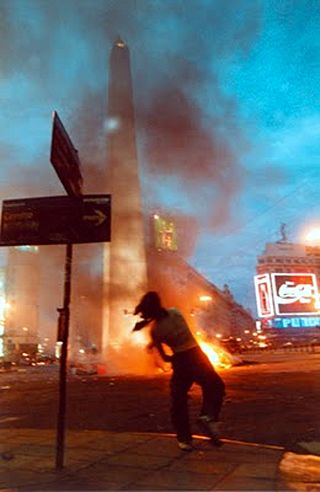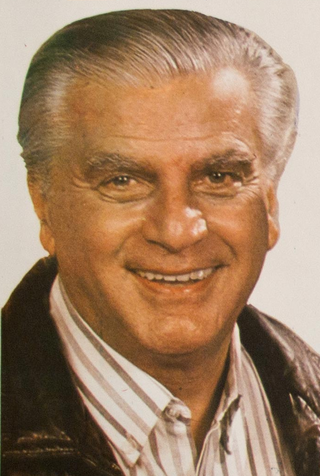
Carlos Saúl Menem was an Argentine lawyer and politician who served as the president of Argentina from 1989 to 1999. Ideologically, he identified as a Peronist and supported economically liberal policies. He led Argentina as president during the 1990s and implemented a free market liberalization. He served as President of the Justicialist Party for thirteen years, and his political approach became known as Menemism.

The government of Argentina, within the framework of a federal system, is a presidential representative democratic republic. The President of Argentina is both head of state and head of government. Executive power is exercised by the President. Legislative power is vested in the National Congress. The Judiciary is independent from the Executive and from the Legislature, and is vested in the Supreme Court and the lower national tribunals. From the own government is also called Presidency of the Nation.
The politics of Argentina take place in the framework of what the Constitution defines as a federal presidential representative democratic republic, where the President of Argentina is both Head of State and Head of Government. Legislative power is vested in the two chambers of the Argentine National Congress. The Judiciary is independent, as are the Executive and the Legislature. Elections take place regularly on a multi-party system.

Domingo Felipe Cavallo is an Argentine economist and politician. Between 1991 and 1996, he was the Minister of Economy during Carlos Menem's presidency. He is known for implementing the convertibility plan, which established a pseudo-currency board with the United States dollar and allowed the dollar to be used for legal contracts. This brought the inflation rate down from over 1,300% in 1990 to less than 20% in 1992 and nearly to zero during the rest of the 1990s. He implemented pro-market reforms which included privatizations of state enterprises. Productivity per hour worked during his five-years as minister of Menem increased by more than 100%. In 2001, he was the economy minister for nine months during the 1998–2002 Argentine great depression. During a bank run, he implemented a restriction on cash withdrawing, known as corralito. This was followed by the December 2001 riots in Argentina and the fall of Fernando de la Rúa as president.

Eduardo Alberto Duhalde is an Argentine former peronist politician who served as the interim President of Argentina from January 2002 to May 2003. He also served as Vice President and Governor of Buenos Aires in the 1990s.

The president of Argentina is both head of state and head of government of Argentina. Under the national constitution, the president is also the chief executive of the federal government and commander-in-chief of the armed forces.

Adolfo Rodríguez Saá is an Argentine Peronist politician. Born in a family that was highly influential in the history of the San Luis Province, he became the province's governor in 1983, after the end of the National Reorganization Process military dictatorship. He remained governor up to 2001, being re-elected in successive elections.

The Chamber of Deputies, officially the Honorable Chamber of Deputies of the Argentine Nation, is the lower house of the Argentine National Congress. It is made up of 257 national deputies who are elected in multi-member constituencies corresponding with the territories of the 23 provinces of Argentina by party list proportional representation. Elections to the Chamber are held every two years, so that half of its members are up in each election, making it a rare example of staggered elections used in a lower house.

The December 2001 crisis, sometimes known as the Argentinazo, was a period of civil unrest and rioting in Argentina, which took place during December 2001, with the most violent incidents taking place on 19 and 20 December in the capital, Buenos Aires, Rosario and other large cities around the country. It was preceded by a popular revolt against the Argentine government, rallying behind the motto "All of them must go!", which caused the resignation of then-president Fernando de la Rúa, giving way to a period of political instability during which five government officials performed the duties of the Argentine presidency. This period of instability occurred during the larger period of crisis known as the Argentine great depression, an economic, political, and social crisis that lasted from 1998 until 2002.
Events in the year 2004 in Argentina.

Alberto José Rodriguez Saá is an Argentine lawyer and politician. He was Governor of San Luis Province on two separate occasions. He was presidential candidate for the center-right peronism, Orthodox and Federal Peronism, in 2007 and 2011.
The Spanish order of precedence is currently prescribed by Royal Decree 2099/1983. The decree establishes the order of precedence of national official activities as well as common regulations to activities organised by municipalities, autonomous communities and other public institutions. The general order established by the decree is modified if the event takes place in the capital, Madrid, instead of elsewhere in Spain.
The order of precedence in Brazil is a symbolic hierarchy of officials used to direct protocol. It is regulated by Presidential Decree number 70.274 of March 9, 1972, signed by former President Emilio Medici. The following order applies to ceremonies hosted by the federal government.

Antonio Francisco Cafiero was an Argentine Justicialist Party politician. Cafiero held a number of important posts throughout his career, including, most notably, the governorship of Buenos Aires Province from 1987 to 1991, the Cabinet Chief's Office under interim president Eduardo Camaño from 2001 to 2002, and a seat in the Senate of the Nation from 1993 to 2005.

Juan Carlos Maqueda is an Argentine lawyer, politician, and a member of the Supreme Court of Justice of Argentina since 2002. As Provisional President of the Argentine Senate in 2001 and 2002, he chaired two legislative assemblies to elect a new President of Argentina during the 1998–2002 Argentine great depression and was acting President in the absence of the President.
Horacio Massaccesi is an Argentine politician who was the former governor of Río Negro Province.

Federal Peronism, also known as Dissident Peronism, is the faction or branch of either moderate, centrist or right-wing Peronism, that is currently identified mostly by its opposition to Kirchnerism, the left-wing faction of Peronism.
The order of precedence in the Philippines is the protocol used in ranking government officials and other personages in the Philippines. Purely ceremonial in nature, it has no legal standing, and does not reflect the presidential line of succession nor the equal status of the three branches of government established in the 1987 Constitution.
The Chilean order of precedence is currently prescribed by the Public Ceremonial and Protocol Regulation. This regulation establishes the order of precedence of national official activities as well as common regulations to activities organized by provinces and regions. The general order established by the decree is modified if the event takes place elsewhere in Chile instead of in Santiago Metropolitan Region.










